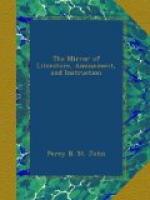Yet, notwithstanding all this clamour of popularity—all this infatuation—there is no branch of the arts so grossly neglected in England as the drama. It is no longer the fashion in London to attend the theatres. Owing partly to the increase of private amusements, and partly to the late hours gradually adopted during the reign of George the Fourth, the custom of play-going has declined among the higher classes, and naturally produces the reaction of bad pieces and indifferent performers. Even a clever actor, when satisfied that he is to receive judgment from an unrefined and uneducated audience, will degenerate and grow slovenly; and from what I have observed of the London stage, I see it is the custom to daub for the galleries, or to creep through the business under cover of a cold, tame mediocrity. Without the slightest patronage from the court or substantial encouragement from the fosterers of literary merit, these luckless personages are expected to attempt the same exertions and intense study, which is rewarded, in foreign countries, by the most flattering and judicious attention; as well as by a pension, to cheer the infirmities of old age. Although tolerably well paid by his manager, the English actor has the mortification of being tyrannized and insulted by the gallery, and overlooked by the higher classes. A few persons of rank and fortune are provided with private boxes at the national theatres; but these are usually let by the night to plebeian tenants. It is rare indeed to observe a family of distinction in the dress circle of either Drury Lane or Covent Garden; while the French play is never deficient in a fashionable audience.
The Opera, too, is nightly becoming more crowded; while at the two patent theatres “a beggarly account of empty boxes,” and an equally beggarly account of flat, stale, and unprofitable performances, greets me whenever I am rash enough to take my post of observation. Lady Romford has a private box, which she visits only in preference to staying at a still duller home, on a disengaged evening; and Bagot occasionally drags me to the play, to make my foreign ignorance and inexperience a pretext for following Lady Clara to a spot which no one seems to visit without an apology. People in society give as many reasons for having done so strange a thing as go to see the new tragedy, as they would invent in Paris to excuse a similar omission.
Since the Kemble munia, and the Byron mania, there has been a general affectation of indifference towards poetry and the drama; your true fashionable never mentions either without ridicule—the natural consequence of previously exaggerated enthusiasm.




